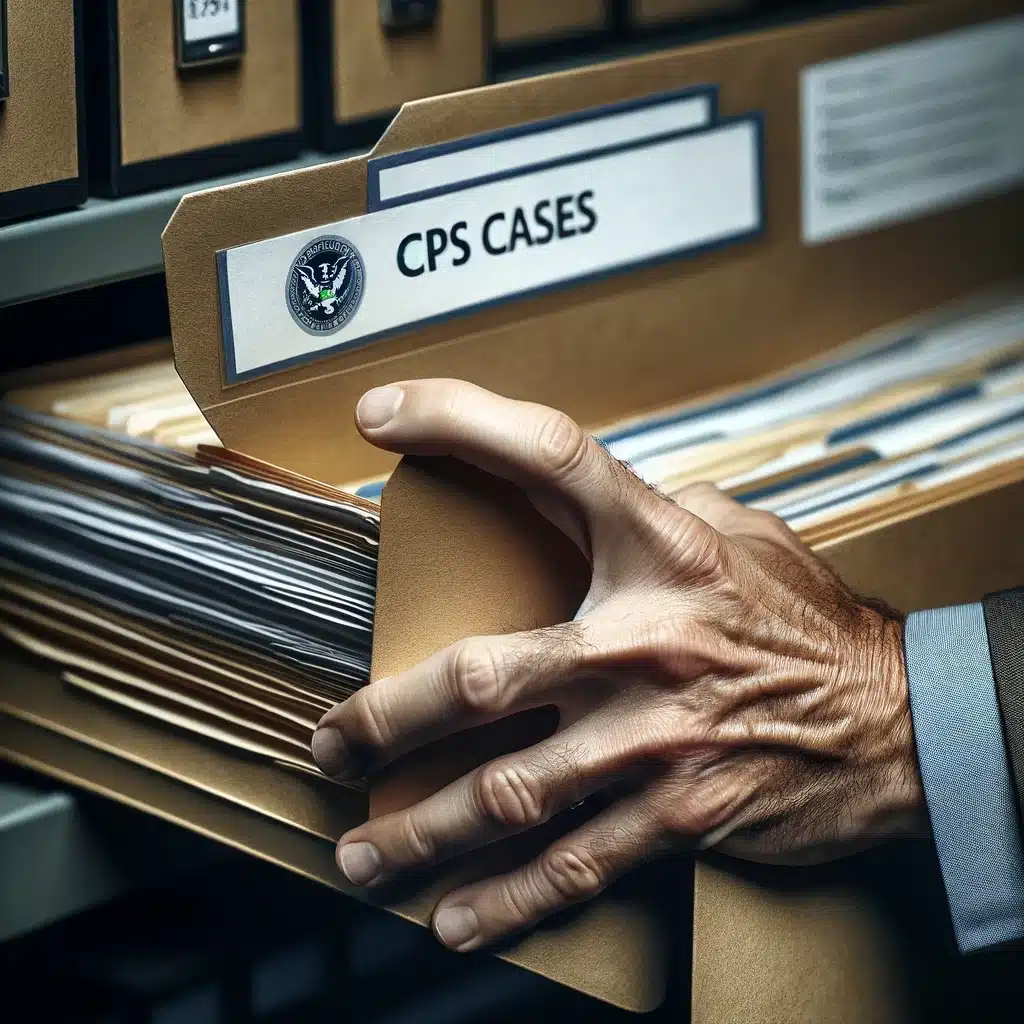Welcome, curious readers, to a journey through the intriguing world of Child Protective Services (CPS). Today, we embark on a quest to uncover the answer to a burning question that has left many bewildered: Can CPS reopen a closed case? Brace yourselves as we explore the ins and outs of this enigmatic subject and equip you with the knowledge to navigate the labyrinthine paths of CPS.

Short answer: Yes, they can! But why, you ask? Oh, dear reader, the reasons are as varied as the colors in a rainbow. From the importance of community support networks to the significance of parenting skills, from the impact of mental health support to the triumphs of rehabilitation and addiction recovery – we have it all covered!
But wait, there’s more! We’ll unveil the secrets of legal rights and advocacy, delve into the power of the parent-child relationship, and uncover the treasures of conflict resolution and anger management. And that’s not all! Financial stability, cultural considerations, and the much-needed support after the storm – we leave no stone unturned.
So, whether you’re a concerned parent, an inquisitive soul, or someone who simply loves a good story, join us on this exhilarating adventure. Get ready for engaging insights, relatable anecdotes, and a playful tone that will keep you hooked from start to finish. You’ll discover the keys to unlocking the mysteries of CPS, all while enjoying a captivating read.
Are you ready, fellow explorers? Let’s dive into the mesmerizing world of CPS and find out if they can reopen a closed case!
Can CPS Reopen a Closed Case?
In the realm of Child Protective Services (CPS), the question of whether a closed case can be reopened often arises. This article aims to shed light on this topic and provide a comprehensive understanding of the factors involved. We will explore various aspects, including community support, parenting skills, mental health support, rehabilitation and addiction recovery, legal rights and advocacy, parent-child relationships, conflict resolution, financial stability, cultural considerations, and post-CPS case support.
The Role of Community Support
When navigating a CPS case, one crucial element is the support offered by the community. The article briefly touches on seeking help from schools, churches, and pediatricians, but it’s important to delve deeper into the significance of community support networks. These networks provide resources and assistance to families involved in CPS cases, helping them address the underlying issues that led to their involvement with CPS. Connecting with local organizations, support groups, and community services can greatly contribute to a family’s successful resolution of their case.
Parenting Skills and Education
Developing effective parenting skills and seeking education in this domain is crucial to preventing future CPS involvement. Positive discipline techniques, open and effective communication, and participating in parenting programs can significantly enhance parenting abilities. This article can provide insights into available resources and programs that help parents acquire the necessary skills to create a safe and nurturing environment for their children.
|
Parenting Skills and Education |
Mental Health Support |
|---|---|
|
Importance of parenting skills and education in preventing CPS involvement |
Significance of seeking professional mental health support for parents and children |
|
Positive discipline techniques, effective communication, and parenting programs |
Therapy options, counseling services, and mental health resources |
|
Promoting healthy parent-child relationships |
Addressing mental health and behavioral issues in children |
|
Strengthening the bond and rebuilding trust |
Providing comprehensive guidance on accessing support and resources |
|
Fostering healthy attachments |
Importance of professional help for both parents and children |
|
Developing conflict resolution techniques and anger management strategies |
Encouraging the utilization of therapy and counseling services |
|
Empowering parents with healthier coping mechanisms |
Highlighting the importance of mental health resources |
|
Preventing situations leading to CPS involvement |
Enhancing the overall well-being of families involved in CPS cases |
|
Promoting a nurturing and supportive environment |
Ensuring long-term mental health support for families |
|
Equipping parents with essential skills and knowledge |
Assisting families in their journey towards healing and growth |
Mental Health Support
While the article mentions mental health and behavioral issues in children, it’s important to emphasize the significance of seeking professional mental health support for both parents and children. Professional therapy options, counseling services, and mental health resources play a vital role in addressing underlying issues and improving the overall well-being of the family. By addressing mental health concerns, families can reduce the risk of future CPS involvement.

Rehabilitation and Addiction Recovery
The article briefly touches upon drug and alcohol abuse as factors leading to CPS involvement. However, it’s important to expand on the process of rehabilitation, recovery programs, and strategies for maintaining sobriety. Understanding the importance of treatment and developing a relapse prevention plan is essential to prevent future CPS cases. Exploring different rehabilitation options and highlighting the role of support groups can offer valuable insights to individuals seeking recovery.
Legal Rights and Advocacy
Understanding one’s legal rights and advocating for oneself within the CPS system is crucial for individuals involved in a case. Familiarizing oneself with the legal process, knowing one’s rights, and accessing legal representation can significantly impact the outcome of a CPS case. This article can provide guidance on legal resources, the role of attorneys, and steps to navigate the legal aspects effectively.
Parent-Child Relationship and Bonding
Emphasizing the importance of nurturing the parent-child relationship and promoting positive bonding experiences is vital in preventing future CPS involvement. Strategies to strengthen the bond, rebuild trust, and foster healthy attachments can contribute to a safe and supportive family environment. This article can offer insights into techniques such as quality time spent together, effective communication, and creating a loving atmosphere.

Conflict Resolution and Anger Management
Given that the article mentions frustration and potential outbursts of anger, addressing conflict resolution techniques and anger management strategies is crucial. Providing guidance on healthy ways to manage conflicts, teaching effective communication skills, and promoting anger management techniques can help parents develop healthier coping mechanisms. By reducing the risk of situations that lead to CPS involvement, families can create a more stable and harmonious environment.
Financial Stability and Resource Management
While the article briefly mentions difficulties in holding down a job and meeting financial obligations, it’s important to provide more information on financial stability and resource management. Topics such as budgeting, financial planning, accessing financial assistance programs, and improving employment prospects are relevant in preventing neglect due to financial struggles. This article can offer practical advice and resources to help families overcome financial challenges.
Cultural Considerations
Discussing the importance of cultural competence within the CPS system is crucial. Recognizing how cultural differences can impact the understanding and interpretation of child-rearing practices is essential for effective interventions. Addressing the need for culturally sensitive approaches and highlighting resources that respect and honor diverse cultural backgrounds can contribute to a more comprehensive understanding of CPS involvement.
Post-CPS Case Support and Transition
Continuing counseling or therapy sessions even after the conclusion of a CPS case is crucial for families. However, it’s important to provide additional guidance on post-case support, transitioning back to normalcy, and accessing resources for ongoing assistance. This article can offer insights into available support networks, educational programs, and services that can aid families in their journey toward healing and stability.
By exploring these topics, this article aims to provide a comprehensive and engaging perspective on the question, “Can CPS reopen a closed case?” Understanding the various factors involved in CPS cases and equipping families with the knowledge and resources to address them effectively can make a significant difference in preventing future CPS involvement.
The Final Verdict: CPS, Closed Cases, and a Dash of Hope
And so, dear adventurers, we reach the end of our exhilarating quest through the labyrinthine world of Child Protective Services (CPS). We have unraveled the mysteries, shed light on the complexities, and explored the nooks and crannies of this enigmatic system. Now, it’s time to uncover the ultimate answer you’ve been eagerly awaiting: Can CPS reopen a closed case?
Drumroll, please! The short answer is… Yes, they can! But fear not, for our journey doesn’t end here. We won’t leave you hanging, oh no! We aim to offer you more than just a simple answer. Our goal is to leave you with a sprinkle of hope, a burst of inspiration, and a gentle reminder that every closed door may hold the potential for a new beginning.
Picture this: A family, once entangled in the clutches of a closed CPS case, now stands strong, united, and thriving. It’s a tale of resilience, where the power of community support, the magic of rehabilitation, and the unwavering bond between parent and child reign supreme. It’s a testament to the human spirit’s ability to overcome adversity, to rise above the challenges, and to create a brighter future.
The Journey of Empowered Advocates
But our story doesn’t end there. It continues with the pursuit of knowledge, the thirst for growth, and the unwavering determination to make a difference. Armed with the understanding of legal rights and the tools of advocacy, families find their voices and create change. They become beacons of hope, guiding others through the storm and helping them find their way back to calm waters.
So, my friends, as we bid adieu to our whirlwind adventure answering “Can CPS reopen a closed case?”, let us carry with us the lessons learned. Let us remember the significance of love, understanding, and forgiveness in the realm of parenting. Let us celebrate the victories, no matter how small, and honor the resilience that lies within us all.
Remember, the closing of a chapter doesn’t mark the end of the book. It simply signals the turning of a page, a chance for growth, and a new beginning. With the right support, unwavering determination, and a sprinkle of hope, families can rise, rebuild, and create a future filled with joy, laughter, and endless possibilities.
So, dear readers, as you step back into the realm of your own lives, carry this knowledge with you. Embrace the power of community, nurture your relationships, seek help when needed, and never forget that every closed case holds the potential for a fresh start.
And now, it’s time for you to embark on your own journeys. May you find the answers you seek, the solutions you crave, and the stories that ignite your soul. Farewell, fellow adventurers. Until we meet again, keep shining bright and never stop believing in the power of second chances.
Ebook
 If you want to know more about what you can do, CLICK the button below to get your FREE E-book: “Child Protective Services E-Book”
If you want to know more about what you can do, CLICK the button below to get your FREE E-book: “Child Protective Services E-Book”
Other Related Articles:
- What to Do When CPS Asks for a Drug Test in Texas
- CPS and how The Law Office of Bryan Fagan, PLLC can help
- Take control of your child’s CPS case by following these tips
- How to stand up for yourself during a Texas CPS case
- What does a Texas CPS investigation look like?
- Family Law Cases in Texas: The final stages of a CPS case
- When can CPS remove your child from your home in Texas and what can you do about it?
- What to do if you no longer like your CPS service plan?
- In what circumstances could your child end up living with your relative during a CPS case?
- What can a CPS investigation into your family mean now and in the future?
- Knowing your rights in a Child Protective Services (CPS) case
Frequently Asked Questions
How long does CPS have to close a case in Texas?
How do you know if a CPS case is closed in Texas?
How long do most CPS cases last?
How does CPS close a case in Texas?
Bryan Fagan, a native of Atascocita, Texas, is a dedicated family law attorney inspired by John Grisham’s “The Pelican Brief.” He is the first lawyer in his family, which includes two adopted brothers. Bryan’s commitment to family is personal and professional; he cared for his grandmother with Alzheimer’s while completing his degree and attended the South Texas College of Law at night.
Married with three children, Bryan’s personal experiences enrich his understanding of family dynamics, which is central to his legal practice. He specializes in family law, offering innovative and efficient legal services. A certified member of the College of the State Bar of Texas, Bryan is part of an elite group of legal professionals committed to ongoing education and high-level expertise.
His legal practice covers divorce, custody disputes, property disputes, adoption, paternity, and mediation. Bryan is also experienced in drafting marital property agreements. He leads a team dedicated to complex family law cases and protecting families from false CPS allegations.
Based in Houston, Bryan is active in the Houston Family Law Sector of the Houston Bar Association and various family law groups in Texas. His deep understanding of family values and his professional dedication make him a compassionate advocate for families navigating Texas family law.




